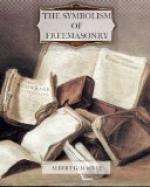The answers to these questions embrace what is, perhaps, the most intricate as well as most ingenious and interesting portion of the science of masonic symbolism.
This symbolism may be interpreted, either in an application to a general or to a special sense.
The general application will embrace the whole history of Freemasonry, from its inception to its consummation. The search after the Word is an epitome of the intellectual and religious progress of the order, from the period when, by the dispersion at Babel, the multitudes were enshrouded in the profundity of a moral darkness where truth was apparently forever extinguished. The true name of God was lost; his true nature was not understood; the divine lessons imparted by our father Noah were no longer remembered; the ancient traditions were now corrupted; the ancient symbols were perverted. Truth was buried beneath the rubbish of Sabaism, and the idolatrous adoration of the sun and stars had taken the place of the olden worship of the true God. A moral darkness was now spread over the face of the earth, as a dense, impenetrable cloud, which obstructed the rays of the spiritual sun, and covered the people as with a gloomy pall of intellectual night.
But this night was not to last forever. A brighter dawn was to arise, and amidst all this gloom and darkness there were still to be found a few sages in whom the religious sentiment, working in them with powerful throes, sent forth manfully to seek after truth. There were, even in those days of intellectual and religious darkness, craftsmen who were willing to search for the Lost Word. And though they were unable to find it, their approximation to truth was so near that the result of their search may well be symbolized by the Substitute Word.
It was among the idolatrous multitudes that the Word had been lost. It was among them that the Builder had been smitten, and that the works of the spiritual temple had been suspended; and so, losing at each successive stage of their decline, more and more of the true knowledge of God and of the pure religion which had originally been imparted by Noah, they finally arrived at gross materialism and idolatry, losing all sight of the divine existence. Thus it was that the truth—the Word—was said to have been lost; or, to apply the language of Hutchinson, modified in its reference to the time, “in this situation, it might well be said that the guide to heaven was lost, and the master of the works of righteousness was smitten. The nations had given themselves up to the grossest idolatry, and the service of the true God was effaced from the memory of those who had yielded themselves to the dominion of sin.”




